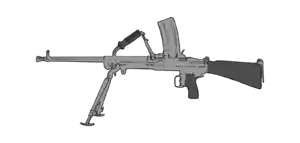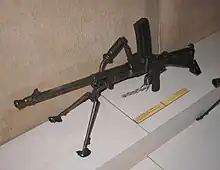Vz. 52 machine gun
The vz. 52 (7,62mm lehký kulomet vzor 52) is a Czechoslovak light machine gun developed after the Second World War for the Czechoslovak Armed Forces.
| vz. 52 | |
|---|---|
 | |
| Type | Light machine gun |
| Place of origin | Czechoslovak Socialist Republic |
| Service history | |
| In service | 1952–1964 |
| Used by | Czechoslovakia Cuba[1][2] Biafra[3] |
| Wars | Bay of Pigs Invasion[4][5] Escambray Rebellion Nigerian Civil War |
| Production history | |
| Designer | Václav Holek |
| Designed | 1950s |
| Manufacturer | Zbrojovka Brno |
| No. built | 8.000 |
| Variants | vz. 52/57 |
| Specifications | |
| Mass | 8.0 kg (17.64 lb) |
| Length | 1,045 mm (41.1 in) |
| Barrel length | 583 mm (23.0 in) |
| Cartridge | 7.62×45mm (vz. 52), 7.62×39mm (vz. 52/57) |
| Action | Gas-operated, tilting breechblock |
| Rate of fire | 900-1150 rounds/min |
| Muzzle velocity | 760 m/s |
| Effective firing range | 900/800 m |
| Maximum firing range | 2800 m |
| Feed system | 50-round belt or 25-round detachable box magazine |
| Sights | Iron sights |
Description

The vz. 52 was originally called the ZB 501,[6] and was designed by Václav Holek.[7] It is gas-operated and uses a tilting bolt that locks into the roof of the receiver. Its overall action is based on the Czech ZB-26 light machine gun. It has an integral bipod and interchangeable barrels, and its feed system is designed to take metallic belts or box magazines interchangeably and without any modifications.[7] Its compact and light lever-type feeding system was based on the ZB-53 and was later copied in UK vz. 59, PK and Negev.
The vz. 52 initially used the Czech 7.62×45mm vz. 52 cartridge, but in the mid-1950s it was converted to the standard 7.62×39mm Warsaw Pact round by Jaroslav Myslík, and named the vz. 52/57.[7] Both models were replaced in Czech service in 1963–64 by the Universal Machine Gun Model 1959, also known as the Uk vz. 59.
See also
Weapons of comparable role, configuration and era
References
- František Krajčír (16 May 1960). "CZECHOSLOVAK MILITARY ASSISTANCE TO THE CUBAN GOVERNMENT" (Czechoslovak Ministry of Foreign Trade) (in Czech). Wilson Center Digital Archive. Retrieved 15 May 2016.
[Of the items requested] it will be possible to satisfy a request for the supply of 7.62mm bullets for the vz.52 self-loading rifle and vz.52 light machine-gun.....If the Cuban needs are to be covered ... it would be necessary to manufacture another 116 million 7.62mm cartridges, and 150 million 9mm cartridges in Czechoslovakia....the first shipment of specialized materials will be sent prior to signing the contract between Czechoslovakia and Cuba. This shipment, valued at about 50 million Kčs CIF, will include 10,000 Czechoslovak 9mm guns, 500 [Vz. 52] light and 250 [ ZB-53? ]heavy machine guns, 100,000 hand grenades and 40 million [small arms ammunition] cartridges.
- MINFAR ( Ministry of Armed Forces) (1981). Manual basico del Miliciano de Tropas Territoriales (in Spanish). Habana: Editorial Orbe.
The tenth chapter, listing infantry weapons, refers to the DP, Vz.52, RP-46 and ZB-53 machine guns in the inventory of the Territorial Troops Militia
- Jowett, Philip (2016). Modern African Wars (5): The Nigerian-Biafran War 1967-70. Oxford: Osprey Publishing Press. p. 23. ISBN 978-1472816092.
- Rodríguez, Juan Carlos (2013). "Chapter 9 En route to the Southern Coast". The Inevitable Battle: From the Bay of Pigs to Playa Girón (in Spanish). Havana: Editorial Capitan San Luis. ISBN 978-959-211-337-4.
Interview of the author with José Ramón González Suca : 'We had....a VZ machine gun with bipod and 200 rounds for belt or magazine feed...After the battle I found out the VZ belts are crap. They're more effective with magazines. But the guys wanted it to be like in the movies. '
- Rodríguez, Juan Carlos (2013). "Chapter 15 The Inevitable Battle". The Inevitable Battle: From the Bay of Pigs to Playa Girón (in Spanish). Havana: Editorial Capitan San Luis. ISBN 978-959-211-337-4.
Interview of the author with Luis "Oriente" Clemente Carralero : 'I told the people with the three BZs[sic] to remove the cartridge belts and use the magazines. We had 200 rounds for each BZ[sic] and 80 for each rifle - nothing compared to what they used against us.'
- Šáda, Miroslav (2004). Československé ruční palné zbraně a kulomety (in Czech). Praha: Naše vojsko. p. 117. ISBN 80-206-0745-5.
- Hogg, Ian V. (1978). The Complete Illustrated Encyclopedia of the World's Firearms. A&W publishing. p. 99. ISBN 9780894790317.
Bibliography
- Dubánek, Martin (2008). Československé 7,62 mm lehké kulomety vz. 52 a 52/57. Praha: Naše vojsko. ISBN 978-80-206-0885-7.
- Rodríguez, Juan Carlos (2013). The Inevitable Battle: From the Bay of Pigs to Playa Girón. Havana: Editorial Capitan San Luis. ISBN 978-959-211-337-4.
- Willbanks, James H (2004). Machine Guns: An Illustrated History of Their Impact. ABC-CLIO. ISBN 978-1-85109-480-6.
External sources
- http://www.valka.cz/newdesign/v900/clanek_11420.html
- http://www.militaria.wz.cz/cs/kulomet-52.htm
- http://www.historieavojenstvi.cz/2007/clanky/holek.pdf